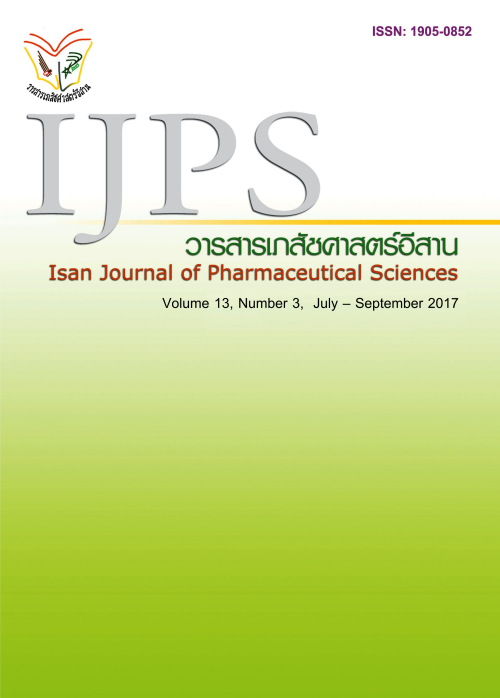Development and Evaluation of a Hospital Medication Reconciliation Process: A Case Study for Diabetic In – patient Service at a Mid - level General Hospital in the Northeast Region
Main Article Content
Abstract
Introductions: Medication errors (ME) can commonly occur in a part of the care transitions process in hospitals. The effective medication reconciliation (MR) process can protect around half of the medication errors before harm. The objectives of this research were, firstly, to analyze the current situation and problems involved in the MR process for proposing further process improvement, and secondly, to evaluate the outcomes after implementing the newly proposed MR process. Materials and Method: Data collection included document analysis, in-depth interviews, focus group discussion with key stakeholders, and evaluate the outcome newly proposed MR process of the hospital admission and discharge process at the in-patient ward among patients with diabetes mellitus. Results: The results showed that most healthcare providers understood the MR concept but they were not aware of how important it was to communicate or document in the in-patient chart when any medication change. In fact, they viewed the MR process as a burden and suggested to lessen the process by applying some information technology. Moreover, there was a lack of involvement from the patients and their families’ contribution toward the MR process. After the newly MR process had been revised and implemented, the number of patients who were assessed MR process increased from 16.67% to 74.4% and 81.76% respectively. Unintentional discrepancy at admission process decreased from 2.08% to 0.17% and 0.15% respectively. The MR success index increased from 0.5% to 0.72% and 0.66%, respectively. The net cost saving of medicine from MR process increased from 2,844 Baht to 10,376.62 Baht and 11,883.33 Baht after the post-intervention period. Conclusion: The newly developed MR process had remarkably improved the MR process, which can reduce ME before harm occur and increase medicine cost saving.
Article Details
In the case that some parts are used by others The author must Confirm that obtaining permission to use some of the original authors. And must attach evidence That the permission has been included
References
Bond C, Raehl C, Franke T. Clinical pharmacy services, hospital pharmacy staffing and medication errors in United States hospitals. Pharmacotherapy 2002; 22: 134-47.
Chanatepaporn P, Anutchatchaval S, Nakornratanachai P. Development of medication at Female-medicine ward in Srinagarind Hospital. Srinagarind Med J 2014; 29(3): 276-282.
Gurwich EL. Comparison of medication histories acquired by pharmacists and physicians. Am J Hosp Pharm 1983; 40: 1541.
Institute of Safe Medication practice (ISMP). Medication safety alert: building a case medication reconciliation [online]. 2005 [cited 2014 Nov 15]. Available from: http://www.ismp.org/MSAarticles/20050421.htm.
Kitjaorapin B. Outcomes of medication reconciliation at medicine wards in Kabinburi hospital [Master Thesis in Pharmacy Program in clinical Pharmacy]. Bangkok: Faculty of Pharmaceutical Sciences, Chulalongkorn University; 2009. [in Thai].
Laemkom A, Somsaad P, Rattanakiat S. Effect of medication reconciliation with computer based program on medication error at Phukhieo Hospital, Chaiyaphum Province. The 4 th Annual Northeast Pharmacy Research Conference of 2012 “Pharmacy Profession in Harmony”; 2012 Feb 11 – 12; Faculty of Pharmaceutical Sciences, Khon Kaen University.
Lizer MH, Brackbill ML. Medication history reconciliation by pharmacists in an inpatient behavior health unit. Ann Pharmacother 2009; 43(10): 1667-75.
Ningsanon T, Montakantikul P, Chulawattanatol S, editors. Medication Reconciliation. Bangkok: Prachachon Co., Ltd. ; 2008.
Srisupanwitaya S. Outcomes of medication reconciliation complete process in surgical chronic disease patients at Samutprakarn hospital [Master Thesis in Pharmacy Program in clinical Pharmacy]. Bangkok: Faculty of Pharmaceutical Sciences, Chulalongkorn University; 2010. [in Thai].
Strunk LB, Matson AW, Steinke D. Impact of a pharmacist on medication reconciliation on patient admission to veterans Affairs medical center. Hospital Pharmacy Journal 2008; 43: 643-649.
Sue-trong C. Developing and implementing medication reconciliation process following transition points in inpatient medication system [Master Thesis in Pharmacy Program in clinical Pharmacy]. Bangkok: Faculty of Pharmaceutical Sciences, Chulalongkorn University; 2005. [in Thai].
The Joint Commission on Acccreditation of Healthcare Organizations (JCAHO). Using medication reconciliation to prevent errors : in sentinel event alert [online] 2006 [cited 2014 Nov 10]. Available from: https://www.jointcommission.org/SentinelEvents/SentinelEventAlert/sea_35.htm.
World Health Organization (WHO). The High5s Project Standard Operating Protocol for Medication Reconciliation [online] 2014 [cited 2017 FEB 9]. Available from : https://www.who.int/patientsafety/%20implementation/solutions/high5s/h5s-sop.pdf


